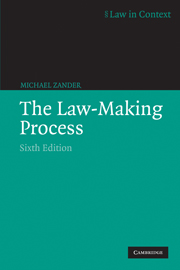Book contents
- Frontmatter
- Contents
- Preface to the sixth edition
- Preface to the first edition
- Acknowledgments
- Books, pamphlets, memoranda and articles excerpted
- Table of cases
- 1 Legislation – the Whitehall stage
- 2 Legislation – the Westminster stage
- 3 Statutory interpretation
- 4 Binding precedent – the doctrine of stare decisis
- 5 How precedent works
- 6 Law reporting
- 7 The nature of the judicial role in law-making
- 8 Other sources of law
- 9 The process of law reform
- Index
5 - How precedent works
- Frontmatter
- Contents
- Preface to the sixth edition
- Preface to the first edition
- Acknowledgments
- Books, pamphlets, memoranda and articles excerpted
- Table of cases
- 1 Legislation – the Whitehall stage
- 2 Legislation – the Westminster stage
- 3 Statutory interpretation
- 4 Binding precedent – the doctrine of stare decisis
- 5 How precedent works
- 6 Law reporting
- 7 The nature of the judicial role in law-making
- 8 Other sources of law
- 9 The process of law reform
- Index
Summary
Precedents are the raw material from which lawyers and judges distil rules of law. Anyone wishing to state the law on a matter not governed by statute – whether he be a judge, a practitioner, an academic or a student – must look at the decided cases. But how does he use the raw material?
The first principle is that anything relevant may be grist to the mill. If there is a clear decision of the House of Lords which is precisely in point, one need usually search no further. If in that case all five Law Lords agreed that the rule of law is X, then for all practical purposes one may assume that it is X. One may still argue that Y would be a better rule and, if one is advising a client prepared to litigate all the way up to the House of Lords, one may consider with him the practical prospects of persuading the Lords to change the rule. But, subject to that rather remote possibility, lawyers are likely to agree that the rule on that point is X.
At the opposite extreme, search for relevant precedents may reveal nothing more than a decision on the point by a county court judge reported briefly only in the Solicitors' Journal, and a remark to the same effect made in the course of giving judgment on a related point in a decision of the High Court of Australia.
- Type
- Chapter
- Information
- The Law-Making Process , pp. 265 - 305Publisher: Cambridge University PressPrint publication year: 2004



